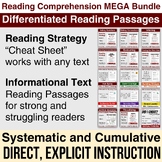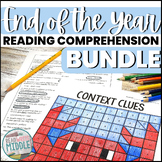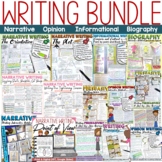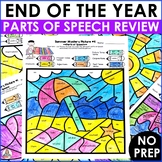71 results
Higher education close reading dbqs
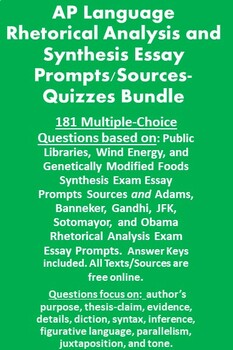
AP Language Rhetorical Analysis and Synthesis-Quizzes Bundle
206 MCQs in 10 Quizzes--Four AP Language Synthesis Essay Exam Sources: Wind Energy, Public Libraries, Genetically Modified Foods, and STEM Initiatives and Six AP Language Rhetorical Analysis Essay Exam Prompt-Texts: Adams, Banneker, Gandhi, JFK, Sotomayor, and Obama. MCQs address: author's purpose, claims-evidence, line-of-reasoning, details, diction, syntax, juxtaposition, parallelism, and tone.Answer Keys included. All Prompts-texts and Sources are free on AP Classroom/College Board. ***If yo
Grades:
9th - 12th, Higher Education, Adult Education
Types:
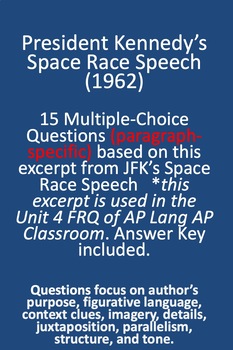
AP Language Rhetorical Analysis: JFK Space Race Speech Excerpt-Quiz
15 MCQs on the excerpt of President Kennedy's Space Race Speech used for the Unit 4 FRQ in AP Lang-AP Classroom. Questions focus on claims, evidence, author's purpose, juxtaposition, parallelism, tone, details, syntax, and figurative language. Full video of the speech is available free at: americanrhetoric.com ***If you love quality and price of this resource and want to help others find it, then please select My Purchases, choose Ratings, and leave Feedback. The more ratings you leave, the mo
Grades:
9th - 12th, Higher Education, Adult Education
Types:
Also included in: AP Language Rhetorical Analysis and Synthesis-Quizzes Bundle
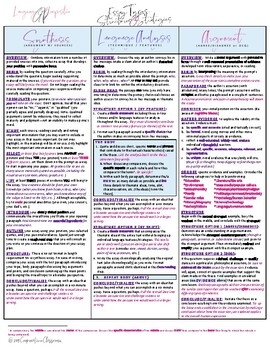
Writing Literacy | AP Essays: Synthesis Language (Rhetorical) Analysis Argument
Talking about Essay Types in AP Language & CompositionHi, Friends!Are your students a bit panicky right now? Help calm student nerves and add this handout into your routine RIGHT AWAY! IN FACT, go ahead and let students use this sheet as they get used to the idea that they'll be writing THREE back-to-back essays in May. Add this to your lesson plan—and then keep the inclusion consistent! Have a discussion about each essay type. AP Language & Composition students in Semester 1 (especially
Grades:
8th - 12th, Higher Education
Types:
Also included in: | AP Language & Composition | Skills-Based | Enriched | Pre-AP | PUSH
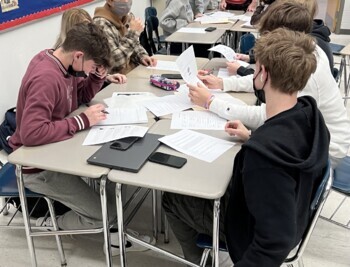
Vehicular Vengeance! - Crime / Mystery Synthesis
This student centered assignment draws upon many of the skills and standards required in an English or language arts course. Students must close-read texts, make annotations, synthesize, present arguments, and use effective listening and speaking skills in a group setting. The set-up is straightforward. Students are placed in groups (typically 4-5 students per). Each group is given the included packet of clues that must be scrutinized in order to present a solution. The clues reveal little on t
Grades:
7th - 12th, Higher Education, Adult Education, Staff
Types:
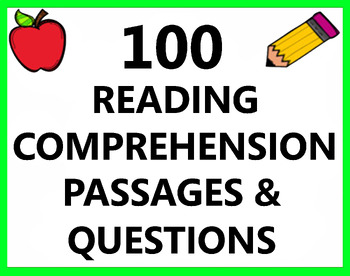
Basic Level English Reading Comprehension Stories Passages Paragraph Questions
This 175 page PDF file includes 100 Reading Comprehension Passages with Multiple Choice and Fill in the Blank questions.The reading comprehension ranges from stories, paragraphs, texts, and passages to give your students a variety to read about. Topics include, but are not limited to, animals, food, sports, cars, family, science, school, and much more!These worksheets have many uses:1. Home school2. Substitute teacher3. Snow days4. Busy work5. Online distance learning6. Class work7. Independent
Subjects:
Grades:
PreK - 12th, Higher Education, Adult Education, Staff
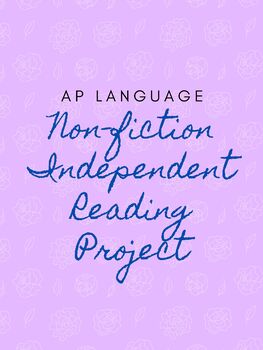
AP Language Independent Reading Project
As AP class time is limited, independent reading time is essential to the AP classroom. This project engages students with the elements of rhetoric and style while introducing them to longer works of nonfiction.
Grades:
9th - 12th, Higher Education
Types:
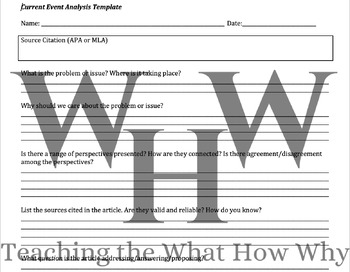
Current Event Analysis and Summary (Honors and AP)
In this current event activity students will document the following:APA or MLA citationissue or problemperspectives presented and their connectionscredibility/validity of sourcesproposed solutions and students generated solutionsauthor's reasoningAfter completing the template, students will write a summary and analysis of the article. This can be used in high school honors and AP classes for weekly current event analysis and discussion.
Grades:
9th - 12th, Higher Education
CCSS:

Close Read--Focus on Language of Text
These three lessons are editable for your convenience. Lessons 1-2 build understanding of the text, while lesson three allows for an assessment. Each lesson has built-in language supports ideal for all. Lessons 1-2 provide exemplars for the Central Tasks. We believe these lessons could be used in 8-12, but have been designed with our own 11th graders in mind under a unit of Ethnic America.
Subjects:
Grades:
8th - 12th, Higher Education
Types:
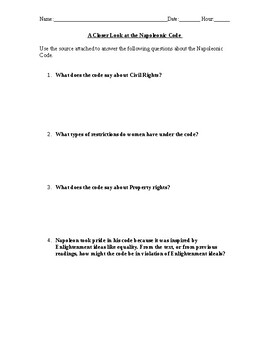
Napoleon: A Closer Look at the Napoleonic Code
This is an excellent resource for anyone cover the French Revolution and Napoleon as it will familiarize students with some of the more important laws that were being enforced during Napoleon's reign.In 1804 Napoleon enacted is Napoleonic Code, the first modern legal code to be adopted with a pan-European scope, and it strongly influenced the law of many of the countries formed during and after the Napoleonic Wars. The Napoleonic Code influenced developing countries outside Europe, especially i
Subjects:
Grades:
9th - 12th, Higher Education, Adult Education
Types:
Also included in: Napoleon
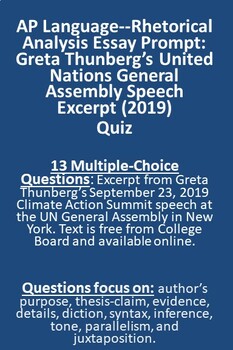
AP Language Rhetorical Analysis: Greta Thunberg UN Speech Excerpt-Quiz
These 13 MCQs are based on the excerpt from Greta Thunberg's Climate Action Summit Speech at the UN in September 2019. Questions are based on specific lines and focus on: author's purpose, thesis-claim, evidence, tone, diction, syntax, parallelism, and juxtaposition. The text is free and available online from College Board.***If you love quality and price of this resource and want to help others find it, then please select My Purchases, choose Ratings, and leave Feedback. The more ratings you le
Grades:
8th - 12th, Higher Education, Adult Education, Staff
Types:
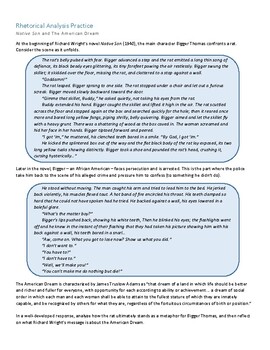
Rhetorical Analysis Essay Prompt - The American Dream
An essay prompt for rhetorical analysis. The topic is The American Dream as it is defined by James Truslow Adams in The Epic of America (1931) and asks students to analyze Richard Wright's message about it based on a metaphor in Native Son (1941). This would work well as a pairing with The Great Gatsby, A Raisin in the Sun, of Mice and Men, In Cold Blood, To Kill a Mockingbird or any other anchor text that has messages about potential for opportunity, dreams and the struggle to realize them, or
Grades:
9th - 12th, Higher Education, Adult Education
Types:

The 1912 Election (4 Speeches and Results)
The 1912 presidential election presented American voters with a diverse array of choices: a conservative and unpopular Republican incumbent, William Howard Taft; a moderate Democratic nominee, Woodrow Wilson, who emerged victorious from a heavily contested nomination; former President Theodore Roosevelt, running as a third-party candidate for the Progressive or "Bull Moose" Party after feeling betrayed by Taft; and Eugene V. Debs, representing the Socialist Party for the fourth time. Tensions ra
Subjects:
Grades:
10th - 12th, Higher Education
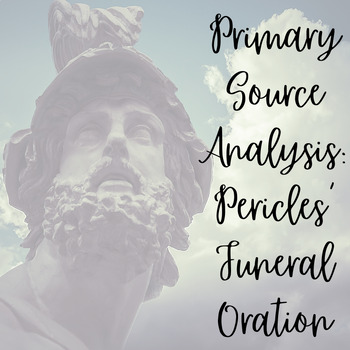
Primary Source Analysis: Pericles' Funeral Oration
In this activity, students will use the SOAPPSTone analysis strategy to analyze an excerpt from Ancient Greece's "Pericles' Funeral Oration." The document includes selected vocabulary definitions, comprehension questions, and an analysis sheet. This activity was originally used with Honors 9th grade World Civilizations, but it is a challenging document!
Subjects:
Grades:
9th - 12th, Higher Education
Types:
Also included in: Unit on Ancient Greece and Rome

Close Reading Using Ronald Reagan's Tear Down This Wall Speech
In this Close Reading we used Ronald Reagan's Tear Down This Wall Speech. The excerpt is followed by eightteen multiple choice questions, an essay prompt, and a complete the chart which challenges the students understanding of Ethos, Pathos, and Logos. This lesson was created for Advanced and Honors 10th,11th, and 12th grade students.This lesson can also be used by those students who are preparing for the SAT or ACT.
Subjects:
Grades:
9th - 12th, Higher Education
Types:
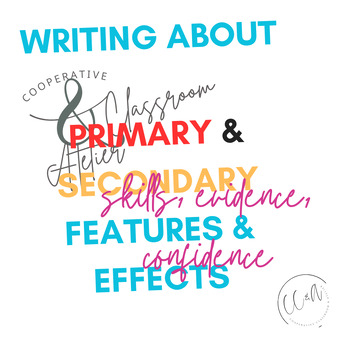
AP Lang V1 |Rhetorical Choice | Features & Effects | Essay Organization Planning
WAIT! Do you want the companion piece (in photo 3) that guides students through thinking and writing about rhetorical choices and working towards stronger effects as well?Working towards Effects in the AP and Pre-AP ClassroomAre your students prepared to discuss the effects of language features? Help calm student nerves and add this handout into your routine---EARLY! Give students a way to critically think about an author’s rhetorical choices and their effects. If both you and your students are
Grades:
8th - 12th, Higher Education, Adult Education, Staff
Types:
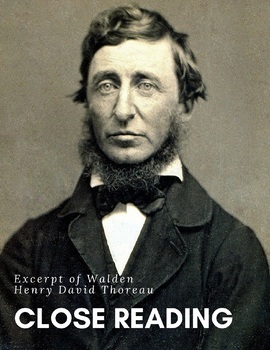
Close Reading Using an Excerpt of Walden by Henry David Thoreau
In this Close Reading we used an Excerpt from Walden by Henry David Thoreau. The excerpt is followed by ten multiple choice questions which challenges the students understanding of the text. This lesson was created for Advanced and Honors 10th and 11th grade students.
Subjects:
Grades:
9th - 12th, Higher Education
Types:
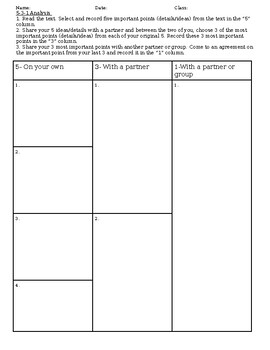
5-3-1 Summarizing/Analysis Graphic Organizer
Helpful for students who need help with summarizing/finding the main idea of a text or visual source, this graphic organizer can be used to analyze nonfiction texts, fictional texts, and primary source documents for social studies. This strategy helps students to flesh out the main ideas of a text, video, or visual source by providing a guide for analysis. This activity encourages academic discussion; promoting partner work for the completion of some portions of the activity. Used with my fifth
Grades:
4th - 12th, Higher Education, Adult Education
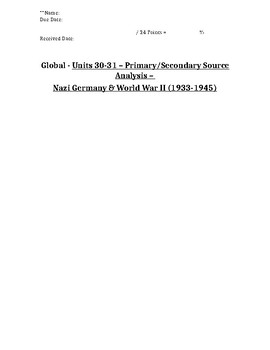
Global - Primary/Secondary Sources - 18/25 - Fascism & World War II - 10th Grade
Twenty-one short-answer questions, worth 24 total points and spanning 14 pages, based on primary and secondary sources about the rise of fascism in Germany, World War II, the Holocaust and genocide. These 14 pages of questions can be useful to any social studies curriculum based on world/global history. This assignment correlates to my 10th grade Units 10-11 (Out of 20 total 10th grade units) of my reading and study guides for global history.Unit 10 (The Rise of Fascism)Unit 11 (World War II)Man
Subjects:
Grades:
6th - 12th, Higher Education, Adult Education, Staff
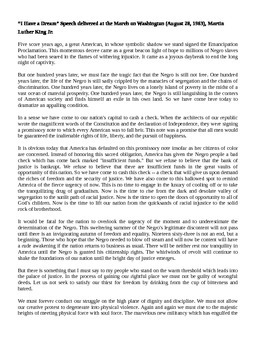
Civil Rights Speech Analysis (ELA-History Common Core Aligned)
Analysis of three key Civil Rights era speeches: 1) Martin Luther King Jr's "I Have a Dream" speech, 2) John Lewis' "The Militant" speech, and 3) Stokely Carmichael's "What We Want" speech. Students read the speech in class, analyze for ELA and History standards, and then write a paragraph analysis. Once all speeches are read, there is a comparison of the three speeches and their effects on the Civil Rights movement and finally a structured essay guideline assignment.
ELA-History Common Core
Grades:
7th - 12th, Higher Education
Types:
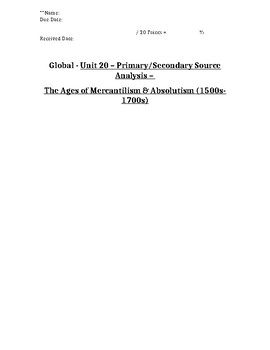
Global - Primary/Secondary Sources - 08/25 - Absolutism/Mercantilism - 9th Grade
Eighteen short-answer questions, worth 20 total points and spanning 12 pages, based on primary and secondary sources about the Ages of Mercantilism (Triangular Trade) & Absolutism (King Louis & Peter the Great). These 12 pages of questions can be useful to any social studies curriculum based on world/global history. This assignment correlates to my 9th grade Units 19-20 (out of 20 total 9th grade units) of my reading and study guides for global history:Unit 19 (Mercantilism & the Tri
Subjects:
Grades:
5th - 12th, Higher Education, Adult Education, Staff
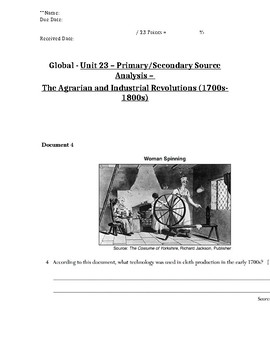
Global - Primary/Secondary Sources - 11/25 - Agrarian Revolution - 10th Grade
Sixteen short-answer questions, worth 23 total points and spanning 14 pages, based on primary and secondary sources about the Agrarian and Industrial Revolutions. These 14 pages of questions can be useful to any social studies curriculum based on world/global history. This assignment correlates to my 10th grade Unit 3 (Out of 20 total 10th grade units) of my reading and study guides for global history:Unit 3 (The Agrarian & Industrial Revolutions)Many of the following sub-topics are also cov
Subjects:
Grades:
6th - 12th, Higher Education, Adult Education, Staff
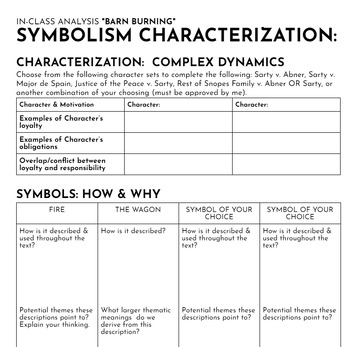
"Barn Burning": Symbolism & Characterization Analysis
This is a perfect document to use if you and your AP class are working to do an in-depth analysis of "Barn Burning." Furthermore, students will get practice in writing AP theses and preparing for a response to the FRQ Prose Question. Still, the short amount of writing students will do for the FRQ Prose is so brief, it is very conducive to focused feedback from teachers. Feel free to adapt it to focus on different literary devices!
Grades:
11th - 12th, Higher Education
Types:
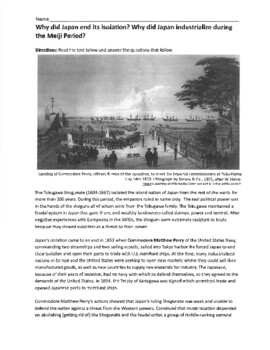
Japanese Meiji Period: Why did Japan Industrialize?
In this resource students will read about Japan during the Tokugawa Shogunate and their policy of isolationism that had been in place for over 200 years. The reading will further explain why Japan abandoned this policy and industrialized during the Meiji period of Japanese history.*Resource includes four reading comprehension questions that will help students focus in the important themes from this era.
Grades:
7th - 12th, Higher Education, Adult Education
Types:
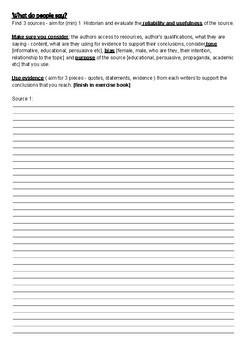
History Sources - Evaluating Reliability and Usefulness
A scaffolded guide to understand and evaluate historical sources for reliability and usefulness. This resource has a checklist and a guide for teachers and students to unpack different sources. This will allow students to examine in-depth and draw conclusions on the reliability and usefulness of a historical source, for historians. Includes guides forPerspectives, Audience, Tone, Reliability, Usefulness, Strengths, Limitatons, Usefulness, Bias, and Purpose
Grades:
9th - 12th, Higher Education, Staff
Types:
Showing 1-24 of 71 results

